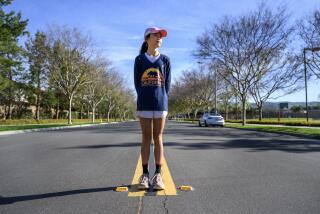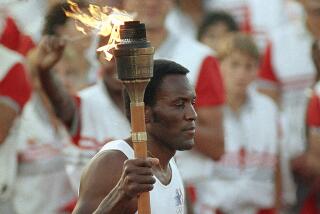It All Starts With the Browns
- Share via
BOSTON — Late this morning, in the town of Hopkinton, 26 miles west of Boston, a Vietnam veteran from Vermont will climb onto a bunting-draped platform, just as his grandfather, father and three uncles have done every Patriots Day for nearly a century.
Walter F. Brown will look over the throng of 38,000 runners and wait for the man next to him to tap his leg. When the signal comes, precisely at noon, Brown will fire a .38-caliber police service revolver, sending the athletes surging forward to start the 100th running of the world’s oldest annual marathon.
Chances are none of the runners know Brown’s name or anything about his family, but the fact is, in a race that is as traditional to Boston as baked beans, the Brown name is synonymous with the Boston Marathon. And without the Browns, the country’s most famous foot race might have disappeared years ago in a sea of debt and disinterest.
To acknowledge their contributions, the Boston Athletic Assn., the marathon’s sponsoring body, has made the Browns the longest-running family show in sports. Every year but one since 1905, one of the Browns has fired the gun to start the race at the invitation of the BAA. The only blip came in 1990, when BAA President Francis Swift insisted on starting the marathon himself, relegating Walter to helping hold the tape at the finish line.
Swift’s disrespect for tradition caused such a stir in Boston that he resigned within the year.
“Without the dedication and perseverance of the Browns during the lean years, we’d have suffered tremendously,” said Gloria Ratti, BAA vice president.
Would there even be a 100th running of the marathon had it not been for the Browns? “I’m not sure,” said race director Guy Morse. “It’s a good question.”
Walter Brown, 50, a captain with the Green Berets during the Vietnam War, lives in Montpelier, Vt., now, the last generation of Browns to pull up roots to Boston and the family farm in Hopkinton. The manager of a food wholesale supply company, he reminisced recently in the den of his home, his scrapbook sitting next to a starting gun his father once used to start the race.
“Sometimes I look around before the race, and I say, ‘What the hell am I doing here?’ ” said Brown, who has started the marathon since 1991.
“I’m not kidding myself. I know I never really did anything but be a Brown. So I guess I represent those who went before me and worked really hard to keep this thing going.”
The inspiration for the Boston Marathon came, in part, from Brown’s grandfather, George V. Brown Sr., a sports promoter and later athletic director at Boston University, who returned from the 1896 Olympics in Athens and helped the BAA organize a race from near his home in Hopkinton to Boston to celebrate the start of spring.
Unlike today’s race, which will attract a million spectators, offer $600,000 in prize money and require the attention of the BAA’s 16-member staff and 10,000 volunteers, the early marathons were something of a nonevent run on a shoestring, with runners vying for a reward of a gold medal, a beef stew dinner and a laurel wreath hastily made the night before.
Sometimes only a handful of spectators lined the route to Boston, and no more than 20 or 30 runners showed up--amateur athletes who labored as brickmen, carpenters and mill workers by day.
George Brown used to put up out-of-town runners for free at his home. He paid endless expenses over the years out of his pocket, promoted the marathon tirelessly and would send his son, Tom (now 81 and living in Wells, Maine) to Boston’s South Station every Patriots Day to ask anyone carrying a gym bag if he were a runner and needed transportation to Hopkinton.
George Sr. was the marathon starter from 1905 until his death in 1937, when his son, Walter A. Brown, took over. Walter--who later founded the Boston Celtics, became president of the Boston Bruins and eventually was enshrined in both the NBA and NHL halls of fame--was one of Boston’s most beloved sports figures and continued to subsidize the marathon as a tribute to his father. He was the race starter from 1938 to 1942 and died in 1964.
One year, another of George’s sons, George Jr., squeezed the starting gun’s trigger and nothing happened. A state patrolman standing nearby responded by unholstering his revolver and firing a live round to the start the runners on their way to Copley Square.
George Jr. fired the starting gun 38 times, dying of cancer four months after his last start in 1981.
“Dad was very insistent he was going to start the marathon the last year, even though he was dying by the minute and there was a lot of pain,” Walter recalled in Vermont.
A golf cart carried George Jr. to the starter’s platform, and Walter and his brother, Ray (now 55 and an artist in Montpelier) carried their father up onto the platform.
Some years before his death, George Jr. was asked if he’d like to see the Brown family tradition continue.
“I’ve given that a lot of thought,” he said. “I hope it happens. I hope the marathon will always be an important part of this family’s life, and I hope we’ll always be associated with it.”
Today, as happens every year on the anniversary of Paul Revere’s ride, one of the Browns will climb onto the starter’s platform for the 91st time. George Jr. would take comfort in knowing that this is a family tradition that may go on forever.
More to Read
Go beyond the scoreboard
Get the latest on L.A.'s teams in the daily Sports Report newsletter.
You may occasionally receive promotional content from the Los Angeles Times.










